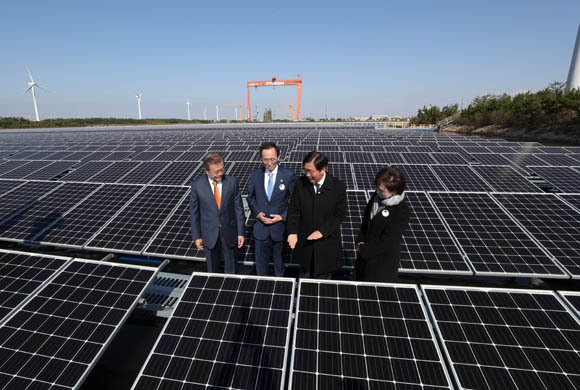[Herald Interview] ‘South Korea’s renewable energy initiative in right direction’
Policies, tax benefits, public understanding for energy transformation mandatory
By Kim Da-solPublished : March 9, 2020 - 15:03

Renewable energy -- utilizing wind, solar, ocean tides and geothermal heat -- has been in the limelight for mitigating global climate change over the past decade.
South Korea also joined the global move by announcing “Renewable Energy 3020” in 2017, which aims to increase power generation from renewable resources to 20 percent. As of 2017, its renewable energy proportion was 7.6 percent.
According to professor Miranda A. Schreurs of Environmental and Climate Policy at Technical University of Munich in Germany, Korea is making tangible changes “in the right direction,” although it has a far way to go.
“Korea is behind many other developed countries in the development of renewable energy and it is important that the government focuses on increasing its scope,” Schreurs said in an interview with The Korea Herald.
“The nation’s goal is a big change from the current situation and is thus a positive development, but it is not as ambitious as many other countries which have already achieved large shares of renewables in their electricity mix. Germany already has over 40 percent renewables in its electricity consumption,” she added.

According to industry data, as of end-2018, Germany’s renewable energy capacity came at 119 gigawatts -- 59 gigawatts from wind and 45 gigawatts from solar energy.
Over the same period, European Union recorded a combined 339 gigawatts in renewable energy capacity. Japan’s capacity came at 86 gigawatts, while Korea’s capacity was 7.86 gigawatts.
Schreurs said more renewables will help Korea contribute more to climate mitigation, as well as increase supply diversity which is important for energy security.
To make sure to steadily raise the renewable energy capacity, Schreurs highlighted the regulatory and policy elements that help to steer industrial investment decisions, giving Germany as an example.
She said the German government’s feed-in-tariff system helped to stimulate individuals and companies to invest in renewable energy technologies.
She also cited policies that were formulated which permitted individuals and energy cooperatives to generate electricity from renewables and sell it into the grid.
“As a result, the majority of renewable energy capacity in Germany is owned by individuals, farmers, and cooperatives and not big companies. This has also meant that money has flown into rural regions -- an important factor in driving support for renewables and also a policy helpful in terms of distributing wealth in the country,” she said.
But Germany still has areas where more needs to be done, according to Schreurs.
“The decision to phase out coal use will be critical for the next phase of renewable energy development. Germany aims to have at least 80 percent of its electricity from renewables by 2050,” Schreurs said.
She also stressed the need for the society to offer public with opportunities to better understand and feel familiar with the concept of renewable energy.
“One important development could be a requirement that new buildings must be net zero energy buildings. This would push the construction industry to be more energy efficient and integrate renewable energy into building designs,” she said.
Schreurs also gave an example of tax incentives for green electricity, which obliges public buildings to target for renovation to improve their energy efficiency and integrate renewable energy.
She stressed the need for education at schools about climate change and biodiversity loss.
“(Such education) should become mandatory and students should be familiarized with the possibilities offered by renewable electricity. The link between new digitization technologies and renewable energy should be introduced into the public debate. Museums can be encouraged to hold exhibitions about energy transitions,” she said.
By Kim Da-sol (ddd@heraldcorp.com)








![[Kim Seong-kon] Democracy and the future of South Korea](http://res.heraldm.com/phpwas/restmb_idxmake.php?idx=644&simg=/content/image/2024/04/16/20240416050802_0.jpg&u=)








![[KH Explains] Hyundai's full hybrid edge to pay off amid slow transition to pure EVs](http://res.heraldm.com/phpwas/restmb_idxmake.php?idx=652&simg=/content/image/2024/04/18/20240418050645_0.jpg&u=20240418181020)

![[Today’s K-pop] Zico drops snippet of collaboration with Jennie](http://res.heraldm.com/phpwas/restmb_idxmake.php?idx=642&simg=/content/image/2024/04/18/20240418050702_0.jpg&u=)